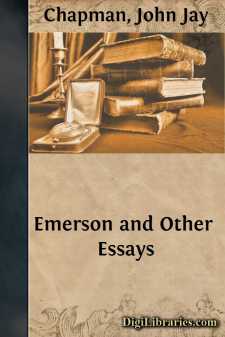Categories
- Antiques & Collectibles 13
- Architecture 36
- Art 48
- Bibles 22
- Biography & Autobiography 813
- Body, Mind & Spirit 142
- Business & Economics 28
- Children's Books 14
- Children's Fiction 11
- Computers 4
- Cooking 94
- Crafts & Hobbies 4
- Drama 346
- Education 46
- Family & Relationships 57
- Fiction 11829
- Games 19
- Gardening 17
- Health & Fitness 34
- History 1377
- House & Home 1
- Humor 147
- Juvenile Fiction 1873
- Juvenile Nonfiction 202
- Language Arts & Disciplines 88
- Law 16
- Literary Collections 686
- Literary Criticism 179
- Mathematics 13
- Medical 41
- Music 40
- Nature 179
- Non-Classifiable 1768
- Performing Arts 7
- Periodicals 1453
- Philosophy 64
- Photography 2
- Poetry 896
- Political Science 203
- Psychology 42
- Reference 154
- Religion 513
- Science 126
- Self-Help 84
- Social Science 81
- Sports & Recreation 34
- Study Aids 3
- Technology & Engineering 59
- Transportation 23
- Travel 463
- True Crime 29
Emerson and Other Essays
by: John Jay Chapman
Categories:
Description:
Excerpt
EMERSON
I
"Leave this hypocritical prating about the masses. Masses are rude, lame, unmade, pernicious in their demands and influence, and need not to be flattered, but to be schooled. I wish not to concede anything to them, but to tame, drill, divide, and break them up, and draw individuals out of them. The worst of charity is that the lives you are asked to preserve are not worth preserving. Masses! The calamity is the masses. I do not wish any mass at all, but honest men only, lovely, sweet, accomplished women only, and no shovel-handed, narrow-brained, gin-drinking million stockingers or lazzaroni at all. If government knew how, I should like to see it check, not multiply the population. When it reaches its true law of action, every man that is born will be hailed as essential. Away with this hurrah of masses, and let us have the considerate vote of single men spoken on their honor and their conscience."
This extract from The Conduct of Life gives fairly enough the leading thought of Emerson's life. The unending warfare between the individual and society shows us in each generation a poet or two, a dramatist or a musician who exalts and deifies the individual, and leads us back again to the only object which is really worthy of enthusiasm or which can permanently excite it,—the character of a man. It is surprising to find this identity of content in all great deliverances. The only thing we really admire is personal liberty. Those who fought for it and those who enjoyed it are our heroes.
But the hero may enslave his race by bringing in a system of tyranny; the battle-cry of freedom may become a dogma which crushes the soul; one good custom may corrupt the world. And so the inspiration of one age becomes the damnation of the next. This crystallizing of life into death has occurred so often that it may almost be regarded as one of the laws of progress.
Emerson represents a protest against the tyranny of democracy. He is the most recent example of elemental hero-worship. His opinions are absolutely unqualified except by his temperament. He expresses a form of belief in the importance of the individual which is independent of any personal relations he has with the world. It is as if a man had been withdrawn from the earth and dedicated to condensing and embodying this eternal idea—the value of the individual soul—so vividly, so vitally, that his words could not die, yet in such illusive and abstract forms that by no chance and by no power could his creed be used for purposes of tyranny. Dogma cannot be extracted from it. Schools cannot be built on it. It either lives as the spirit lives, or else it evaporates and leaves nothing. Emerson was so afraid of the letter that killeth that he would hardly trust his words to print. He was assured there was no such thing as literal truth, but only literal falsehood. He therefore resorted to metaphors which could by no chance be taken literally. And he has probably succeeded in leaving a body of work which cannot be made to operate to any other end than that for which he designed it....



